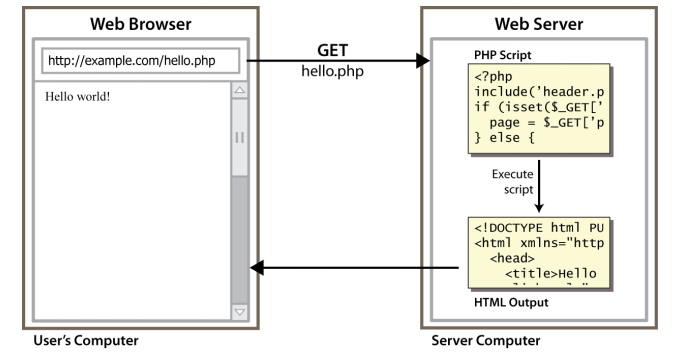CSE 154
Lecture 13: Intro to PHP

Review: Course outline
HTML: Webpage content
CSS: Webpage presentation
JavaScript: Webpage functionality (client-side)
AJAX: Fetching data from the internet
PHP: Server-side code with PHP
Regular Expressions: Validating input
SQL: Storing data
URLs and Web Servers
https://server/path/fileUsually when you type a URL in your browser:
- Your computer looks up the server's IP address using DNS
- Your browser connects to that IP address and requests the given file
- The web server software (e.g. Apache) grabs that file from the server's local file system and then send back its contents to you
Some URLs actually specify programs that the web server should run, and then send their output back to you as the result:
https://webster.cs.washington.edu/cse154/quote.php
The above URL tells the server webster.cs.washington.edu to run the
program quote.php and send back its output
Server-Side Programming

Server-side programs are written using programming languages/frameworks such as:
Web servers contains software to run those programs and send back their output
Each language/framework has its pros and cons
Popularity of languages/frameworks can change quickly:
- Programming Language Popularity
- Google Trends for popular framworks, and those plus php.
We will use PHP for server-side programming
Lifecycle of a PHP Web Request

Browser requests a .html file (static content): server
just sends that file
Browser requests a .php file (dynamic content): server
reads it, runs any script code inside it, then returns the output
Console Output: print
print "text";
echo "text";
PHP (template)
print "Hello, World!\n";
print "Escape \"chars\" are the SAME as in Java!\n";
print "you can have
line breaks in a string.";
print 'A string can use "single-quotes". It\'s cool!';
PHP (example)
Hello, world!
Escape "chars" are the SAME as in Java!
You can have line breaks in a
string. A string can use "single-quotes". It's cool!
output
Some PHP programmers use the equivalent* echo instead of
print
PHP file skeleton
<?php
//PHP code goes here
echo "This is a test!";
?>Output
This is a test!
output
Arithmetic Operations
+ - * / %
. ++ --
= += -= *= /= %= .=
Many operators auto-convert types: 5 + "7" is 12
Variables
$name = expression;
PHP (template)
$user_name = "Pokemon4Lyfe";
$age = 25;
$age_in_dog_years = $age / 7;
$this_class_rocks = TRUE;
PHP (example)
Names are case-sensitive; separate multiple words with _ (as in
$user_name)
Names always begin with $ on both declaration and usage
Implicitly declared by assignment (type is not written; a "loosely-typed" language)
Types
Basic types:
integer
,
float
,
boolean
,
string
,
array
,
object
,
NULL
Test what type a variable is with is_type functions, e.g. is_string
gettype function returns a variable's type as a string (not
often needed)
PHP converts between types automatically in many cases:
stringtointauto-conversion on+for("1" + 1 == 2)inttofloatauto-conversion on/for(3 / 2 == 1.5)
Type-cast with (type):
$age = (int) "21";
String Type
$favorite_food = "Ethiopian";
print $favorite_food[2];
PHP
0-based indexing using [] bracket notation
String concatenation is . (period) not +
5 + "2 turtle doves"produces 75 . "2 turtle doves"produces "52 turtle doves"
Can be specified with "" or ''
String Functions
# index 0123456789012345
$name = "Kyle Thayer";
$length = strlen($name); # 10
$cmp = strcmp($name, "Whitaker Brand"); # < 0
$index = strpos($name, "y"); # 1
$last = substr($name, 5, 6); # "Thayer"
$name = strtoupper($name); # "KYLE THAYER"
PHP
| Name | Java Equivalent |
|---|---|
| strlen | length |
| strpos | indexOf |
| substr | substring |
| strtolower, strtoupper | toLowerCase, toUpperCase |
| trim | trim |
| explode, implode | split, join |
Interpreted Strings
$age = 16;
print "You are " . $age . " years old.\n";
print "You are $age years old.\n"; # You are 16 years old.
PHP
Strings inside " " are interpreted
- Variables that appear inside them will have their values inserted into the string
Strings inside ' ' are not interpreted:
print 'You are $age years old.\n'; # You are $age years old.
PHP
If necessary to avoid ambiguity, you can enclose the variable in {}:
print "Today is your $ageth birthday.\n"; # ageth not found
print "Today is your {$age}th birthday.\n";
PHP
bool (Boolean) Type
$feels_like_summer = FALSE;
$php_is_rad = TRUE;
$student_count = 217;
$nonzero = (bool) $student_count; # TRUE
PHP
The following values are considered to be FALSE (all others are
TRUE):
- 0 and 0.0
- "", "0", and
NULL(includes unset variables) - arrays with 0 elements
Can cast to boolean using (bool)
FALSE prints as an empty string (no output); TRUE prints as
a 1
For Loops
for (initialization; condition; update) {
statements
}
PHP (template)
for ($i = 0; $i < 10; $i++) {
print "$i squared is " . $i * $i . "\n";
}
PHP (example)
If/Else Statements
if (condition) {
statements;
} else if (condition) {
statements;
} else {
statements;
}
PHP (template)
Can also use elseif instead of else if
While Loop (same as Java)
while (condition) {
statements;
}
PHP (template)
do {
statements;
} while (condition);
PHP (template)
break and
continue
keywords also behave as in Java (do not use these in this course)
Comments
# single-line comment
// single-line comment
/*
multi-line comment
*/
PHP
Like Java, but # is allowed
- A lot of PHP code uses
#comments instead of// - We recommend
#and will use it in our examples
Arrays
$name = array(); # create
$name = array(value0, value1, ..., valueN);
$name[index] # get element value
$name[index] = value; # set element value
$name[] = value; # append PHP$a = array(); # empty array (length 0)
$a[0] = 23; # stores 23 at index 0 (length 1)
$a2 = array("some", "strings", "in", "an", "array");
$a2[] = "Ooh!"; # add string to end (at index 5) - to append, use bracket notation without specifying an index
- element type is not specified; can mix types
Functions
function name(parameterName, ..., parameterName) {
statements;
} function bmi($weight, $height) {
$result = 703 * $weight / $height / $height;
return $result;
} - parameter types and return types are not written
- a function with no return statements is implicitly "void"
Calling Functions
name(expression, ..., expression);
$w = 163; # pounds
$h = 70; # inches
$my_bmi = bmi($w, $h);
- if the wrong number of parameters are passed, it's an error